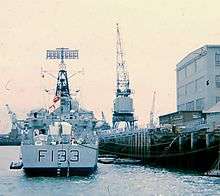HMS Tartar (F133)
.jpg) Aerial view of Tribal-class frigate HMS Tartar (F133), 1971 (IWM) | |
| History | |
|---|---|
| Name: | HMS Tartar |
| Operator: | Royal Navy |
| Builder: | Devonport Dockyard |
| Laid down: | 22 October 1959 |
| Launched: | 19 September 1960 |
| Commissioned: | 26 February 1962 |
| Decommissioned: | 29 March 1984 |
| Identification: | F133 |
| Motto: | Without Fear |
| Fate: | Sold to Indonesia, 1984 |
| History | |
| Name: | KRI Hasanuddin |
| Operator: | Indonesian Navy |
| Acquired: | 1984 |
| Identification: | 333 |
| General characteristics | |
| Class and type: | Tribal-class frigate |
| Service record | |
| Operations: | Third Cod War |

HMS Tartar was a Tribal-class frigate of the Royal Navy (RN). She was named after the Tartar people, most of whom were located in Asia and Eastern Europe. She was sold to Indonesia in 1984.
Tartar was built by Devonport Dockyard,[1] at a cost of £4,140,000.[2] She was launched on 19 September 1960 and commissioned on 26 February 1962.[1]
Service history
Royal Navy
While in the West Indies in 1963, Tartar provided support to Trinidad after Hurricane Flora struck the Caribbean.[3][4] In early December, Tartar's crew apprehended nine armed Cuban on board a ship off Cay Sal, Bahamas, where an arms cache was discovered by a ship's party.[5]
Tartar recommissioned on 12 January 1967 under Captain Cameron Rusby and attended Portsmouth Navy Days later that year.[6] The frigate arrived in the Persian Gulf in 1968 via Simonstown, Mombasa and the Seychelles. On the voyage to the Seychelles the fleet auxiliary vessel RFA Ennerdale was lost, having struck a submerged object. Service in the Gulf was followed by a homeward journey via the Beira Patrol lasting six weeks and Cape Town thence to Gibraltar arriving during the talks between Harold Wilson, Prime Minister and Ian Smith from Rhodesia on board the cruiser Tiger.
In 1975, Tartar undertook fishery protection duties in the Barents Sea. She supported operations during the Third Cod War with Iceland. During the dispute, Tartar was rammed by the patrol vessel ICGV Týr on 1 April,[7] and by ICGV Ægir in May.[8] Later that year, in the West Indies, Tartar searched for and located the wreckage of Cubana Flight 455. She was present at the Spithead Fleet Review in 1977, held in honour of Queen Elizabeth II's Silver Jubilee. At this time she was part of the 1st Frigate Squadron.[9]
Tartar was reduced to reserve in 1980, being placed in the Standby Squadron.[10] She was taken out of reserve during the Falklands War and restored for active service.[11] The frigate did not deploy to the South Atlantic, however, instead operating in home waters in the absence of other warships. She did deploy to the West Indies as guardship in 1982/1983 for 3 months, spending Christmas and new Year in St Petersburg Florida. In June 1983, Tartar's Westland Wasp helicopter evacuated the six-man crew of the supply ship MV Spearfish, which had collided with an oil rig in the English Channel. As a potential hazard to navigation, Spearfish had to be sunk by the guns of Tartar.[12]
Indonesian Navy
Tartar was decommissioned in 1984 and sold to Indonesia. She was commissioned into the Indonesian Navy as Hasanuddin,[13] so named after a sultan who fought the Dutch. The frigate has since been decommissioned. Her name was given to a Dutch-built Sigma-class corvette.
Commanding Officers
| From | To | Captain |
|---|---|---|
| 1965 | 1966 | Commander R D Franklin RN |
| 1967 | 1967 | Commander J R C Johnston RN |
| 1969 | 1971 | Captain Cameron Rusby RN |
| 1977 | 1977 | Commander M A C Moore RN |
| 1977 | 1979 | Lieutenant Commander J R Stanford RN |
References
- 1 2 Gardiner, Robert & Chesneau, Roger (1995), p. 518.
- ↑ "A-Submarine Cost Revised". The Times (56304): Col F, p 8. 24 April 1965.
- ↑ "Hurricane Kills More Than 400". The Times (55825): Col F, p 10. 7 October 1963.
- ↑ "Tobago Prepares To Rebuild". The Times (55827): Col B, p 10. 9 October 1963.
- ↑ "British Patrol Arrests Nine Cubans". The Times (55873): Col E, p 10. 2 December 1963.
- ↑ Programme, Navy Days Portsmouth, 26–28 August 1967, HMSO, p17.
- ↑ "Rammings damage cod war frigates". The Times (59670): Col A, p. 4. 3 April 1976.
- ↑ "Mr Crosland stands by for cod war message". The Times (59714): Col D, p. 4. 27 May 1976.
- ↑ Winton, John (July 1977) "Spithead – 28 June 1977". The Naval Review: Vol. 65, No. 3, p. 203.
- ↑ Hansard (26 April 1982), hansard.millbanksystems.com. Retrieved 13 March 2012.
- ↑ Hansard (27 May 1982), hansard.millbanksystems.com. Retrieved 13 March 2012.
- ↑ "Ship's crew saved after oil rig collision". The Times (61572): Col D, p. 1. 30 June 1983.
- ↑ Colledge, J. J. & Warlow, Ben (2010), p. 397
Publications
- Colledge, J. J. & Warlow, Ben (2010) [1969]. Ships of the Royal Navy: The Complete Record of all Fighting Ships of the Royal Navy (4th Rev. ed.). London: Chatham. ISBN 978-1-935149-07-1.
- Gardiner, Robert & Chesneau, Roger (1995), Conway's All The World's Fighting Ships, 1947–1995, Conway Maritime Press, London, ISBN 978-0-8517-7605-7.
- Marriott, Leo, 1983. Royal Navy Frigates 1945–1983, Ian Allen Ltd. ISBN 07110 1322 5